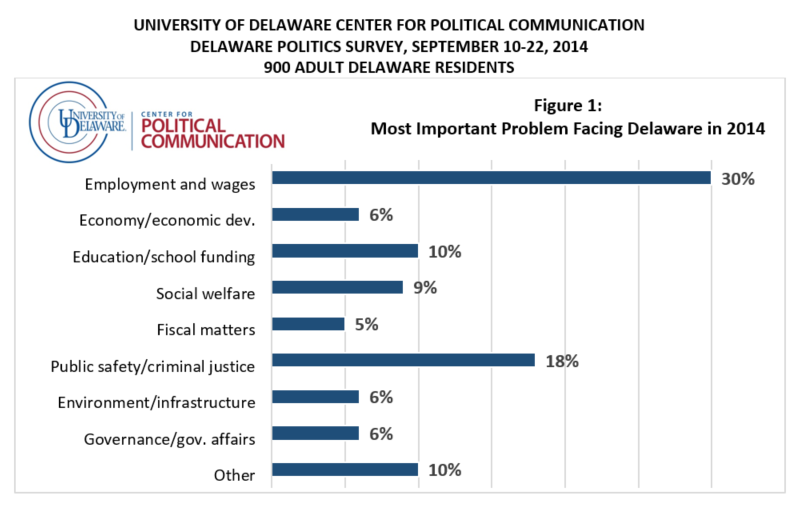Key issues facing Delaware: Divides along race, location and party : Key issues facing Delaware
Divides along race, location and party

Guest Analysis by Dr. Theodore J. Davis, August 1, 2016 — The 2014 Delaware Politics Survey, conducted by the University of Delaware’s Center for Political Communication, shows that employment and public safety issues ranked as the top concerns of Delawareans. These issues will likely shape voting decisions in 2016.
In the 2014 survey, Delawareans were asked: “What do you think is the most important problem facing Delaware today?” Of those surveyed, 30% named employment (including unemployment and wages) as a top problem (Figure 1). Public safety (including violence, crime, drugs, police and prison issues) followed with 18%. Another 10% said that education (including school funding) was one of the most important issues facing the state.
The results show a racial divide on the state’s policy priorities. Among Black Delawareans, 35% said that public safety was one of the most important issues facing the state, while 34% named employment. Among White Delawareans, 28% said employment and only 14% named public safety (Table 1). The Black/White divide on education was smaller, with 8% of Black Delawareans and 12% of White Delawareans naming it as one the most important issues facing the state.
The survey also showed differences in perceptions of the most important problem facing Delaware based on county of residence (Table 2). Only 14% of respondents from Kent County and 13% from Sussex County named public safety issues, versus 22% of those from New Castle County. The percentages of Kent (14%) and Sussex (12%) County respondents who named social welfare issues as important were more than double the percentage for New Castle County (6%). A larger proportion of New Castle County respondents (12%) saw education as important compared to those from Kent County (6%), with respondents from Sussex County falling in between (10%). Around 30% of the respondents from each county identified employment as a top problem.
The results revealed partisan differences in issue priorities, particularly on governance and public safety (Table 3). Respondents who identified as Republicans named employment (36%), governance and government affairs (13%), and public safety (11%) as the most important problems facing the state. Meanwhile, Democrats named employment (31%), public safety (25%), and education (10%) as important. The results for Independents were closer to those for Democrats than for Republicans.
Only 5% of urban residents named education as a top issue facing Delaware, versus 10% of suburban residents and 15% of rural residents (Table 4). Compared to suburban residents (7%), more urban (14%) and rural (11%) residents named social welfare problems as important. Concerns about employment (28% to 30%) and public safety (18% to 20%) were similar across all three geographical categories.
The survey showed a large difference in the perceptions of registered and non-registered voters on public safety as an important problem facing the state (Table 5). Whereas 29% of the non-registered voters identified this issue as important, only 17% of registered voters did so. Registered and non-registered voters also parted ways on issues related to the environment, infrastructure or traffic. Although 13% of non-registered voters cited these issues as important, only 5% of the registered voters concurred.
About the study
The “Delaware Politics Survey: 2014” was a project of the University of Delaware’s Center for Political Communication (CPC). Results are based on telephone interviews with a representative sample of 900 adult Delaware residents. Telephone interviews were conducted via landline (n=450) and cell phone (n=450). The data were collected from September 10-22, 2014. Statistical results are weighted to correct known demographic discrepancies. The margin of sampling error for the complete set of weighted data is – three percentage points.
The author of this topline report was Dr. Theodore J. Davis, Jr. Dr. Davis is a professor in the Department of Political Science and International Relations. He can be reached directly at [email protected] or phoned at 302.831.8580. The interpretation and conclusions are those of Dr. Davis.
